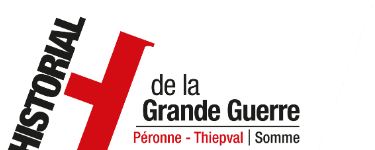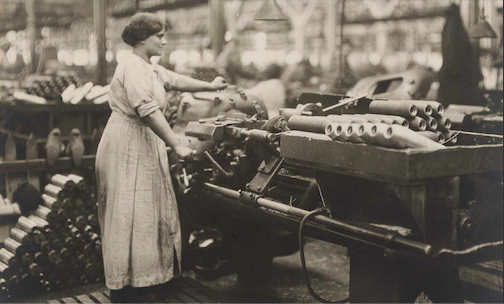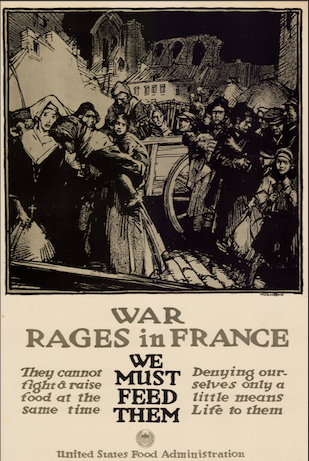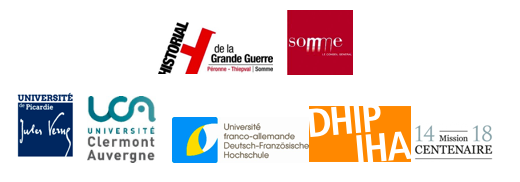|
Summer school – Supplying the War: Production, Transportation, Consumption (1914-1920) The International Research Centre of the Historial de la Grande Guerre, Péronne, with its partners at the German Historical Institute Paris, the TU Berlin, the Université de Picardie Jules Vernes (Amiens) and the Université Clermont-Auvergne invites applications for its fourth summer school for graduate students working on the First World War. From 29 June to 4 July 2020, we will bring together an international group of 20 to 30 young researchers working on the military, cultural, social, and economic history of the First World War. During the week spent together, they will have the opportunity to exchange amongst themselves, but also with a large number of internationally renowned researchers. Guided tours and excursions to the Paris region, the Argonne and the Hauts-de-France (Somme) are an integral part of the programme and enrich the experience of the participants.
Figure 1 : Usine Citroën, Paris, Tourneuse d’obus, 1915 ; La Contemporaine, VAL 364/049 Following the 2014, 2016, and 2018 editions of our summer school, which respectively focused on initiations into contemporary war experiences (https://1418.hypotheses.org/552), on the "face" of battle and the battlefield (https://1418.hypotheses.org/1068) and on the environmental history of the Great War (https://1418.hypotheses.org/1502), the 2020 edition will focus on questions relating to the "fuel" of the Great War. In addition to devouring human lives, the Great War was also at the origin of a huge consumption of raw materials, foodstuffs and finished products, whether or not they were intended for combat. On the basis of this observation, the intention of the 2020 summer school is to question the logic, mechanisms and dynamics that make it possible to fuel the war, i.e. to try to understand the motivations and modalities of the functioning of armies at war through the products consumed, the populations involved, the structures invested and the consequences that result from them between 1914 and 1920. In this respect, three main areas stand out.
At the intersection of these three major axes, several issues need further exploration. First of all, the conditions of war and the need to fuel the war show the ability of societies to adapt to total war: rediscovery of techniques or products, reopening of structures or networks, response to an urgent request, in a climate of multiple tensions. In fact, here the concept of agentivity, applicable to individuals, structures and states, takes on its full meaning. Second, supplying the war means questioning the immersion of the ordinary in the exceptional and the intricacy of the extraordinary in everyday life. This is the case for soldiers and civilians, of course, but also for institutions or businesses, with repercussions on practices, but also representations in a context of antagonism between discourse and reality (patriotism-fatigue, sacrifice-individualism or scarcity-wasting, for example). Finally, the theme of permeability between the fronts and the home front is central here. It appears to be the driving force behind the links that structure nations at war, as the exchanges between the two spaces are numerous, varied and fundamental.
Figure 2: Poster, United States Food Administration, Jeff Townsend, 1918; University of North Texas Digital Library ProgrammeParticipants will benefit from guided tours of the battlefields and memorial sites in the Paris region, Argonne and the Hauts-de-France (Somme), with specialists and experts in wartime procurement. The locations chosen will make it possible to compare different belligerents and to understand these territories as spaces globalized by the conflict. ConditionsAdvanced research masters and doctoral students can apply to the summer school. Research themes directly related to the school's theme or showing how this research can be linked to it will be privileged, but all masters or doctoral students working on the First World War and its consequences may apply. Candidates should be aware that some field trips, particularly in the forest, may take place off marked roads and in rough terrain which necessitates adequate equipment (clothing, shoes, backpack). We will cover accommodation (single or double room; shared sanitary facilities), transportation during the week of the summer school, entrance fees for the different sites and most meals. We strongly encourage applicants to try to secure partial or total funding for the travel costs from their home university and to provide us with any necessary details. We also hope, without any certainty, to be able to contribute to the travel costs of participants to/from Paris, in particular for those whose home institutions do not subsidise this type of expenditure Applications (in English or French) consisting of a 1-page summary of the candidate’s field of research [or: “research interests”] and a 1-page academic CV must be received before midnight on 12 January 2020 online. Procedure: We will notify applicants whether their applications have been accepted by the end of January 2020.
Emmanuelle Cronier (Université de Picardie Jules-Vernes – Centre d’histoire des sociétés, des sciences et des conflits) Caroline Fontaine (Centre International de Recherche de l'Historial de la Grande Guerre, Péronne) Franziska Heimburger (Sorbonne-Université – EA Histoire et Dynamique des Espaces Anglophones) Stéphane Le Bras (Université Clermont-Auvergne – Centre d’Histoire « Espaces et cultures ») Elisa Marcobelli (Université de Picardie Jules-Vernes – Centre d’histoire des sociétés, des sciences et des conflits) Contact : ecole-ete@cirhgg.org
|
| Online user: 6 | Privacy |

|




